In the ancient land of Iran, where mountains scraped the sky and rivers whispered through valleys, there existed myths that stirred the hearts of warriors and scholars alike. One of the most revered stories, passed down through generations, is the tale of the Div-e Sefid, the White Demon. This is a tale of bravery, wisdom, and the eternal struggle between good and evil, where heroes must confront their darkest fears and confront the monstrous forces that threaten the very essence of the world. Join me as we embark on a journey through the majestic mountains of Mazandaran, where legends live and heroes rise. Mazandaran, a province nestled between the towering Alborz Mountains and the shimmering Caspian Sea, was a place of unparalleled beauty. Its dense forests, towering peaks, and misty mornings were filled with mystery. But amid its natural beauty, there was also danger. For deep within the darkest recesses of the mountains, hidden among the jagged rocks and twisting caves, lurked the Div-e Sefid, a fearsome creature whose very name sent shivers through the bravest of men. The Div-e Sefid was no ordinary demon. He was massive, his skin as pale as the snow-capped peaks, his eyes glowing with malice, and his strength unmatched by any mortal. Legends spoke of his fury, of how he could crush armies with a single blow and reduce cities to ruins with the mere stomp of his foot. The people of Mazandaran lived in perpetual fear, knowing that the Div-e Sefid could descend upon them at any moment. But where there was darkness, there was also hope. For in the city of Zabol, far from Mazandaran's cursed mountains, there lived a hero, a man whose name would echo through the annals of history: Rostam. Rostam, the son of Zal, was a warrior of unparalleled might. Born into the royal family of Zabol, his strength and valor were unmatched even from a young age. His steed, the mighty Rakhsh, was as famed as he was, and together they had vanquished countless enemies, protected the innocent, and brought peace to the land. But no challenge he had faced so far would compare to the one awaiting him in the mountains of Mazandaran. It all began when news of the Div-e Sefid’s latest atrocity reached the court of King Kay Kavus. The demon had once again descended upon the villages of Mazandaran, destroying crops, burning homes, and leaving devastation in his wake. The king, though powerful, knew that no ordinary army could defeat the White Demon. Desperate, he summoned Rostam. “My dear Rostam,” the king said, his voice heavy with sorrow. “The people of Mazandaran are in dire need. The Div-e Sefid grows bolder with each passing day, and soon, he will turn his wrath upon us. I fear no man can defeat him... but you are no ordinary man.” Rostam listened intently, his face set in determination. “I will face the White Demon,” he said, his voice unwavering. “I will travel to the mountains of Mazandaran and bring an end to this terror.” With the king’s blessing and the hopes of an entire kingdom resting on his shoulders, Rostam mounted Rakhsh and set off for Mazandaran. The journey to Mazandaran was treacherous. Rostam and Rakhsh traveled for days through scorching deserts, across vast plains, and finally into the towering Alborz Mountains. The air grew colder with each passing hour, and the once bright sky turned gray, as if the land itself was warning him of the dangers that lay ahead. As they climbed higher, the forest grew denser, and the paths more twisted. But Rostam was undeterred. He knew that the Div-e Sefid awaited him, and he would not rest until the demon was defeated. Along the way, he encountered wild beasts and treacherous mountain passes, but none could stop him. On the seventh day of his journey, as he camped under the stars, Rostam heard a voice. It was not human, but a deep, guttural growl that seemed to echo from the very earth itself. “Who dares enter my domain?” the voice rumbled. Rostam stood, his hand gripping his sword tightly. “I am Rostam, son of Zal, and I have come to defeat the White Demon.” Laughter filled the night air, a cruel, mocking sound that chilled Rostam to his core. “You are brave, warrior, but bravery alone will not save you. Turn back now, or face your doom.” But Rostam did not turn back. He was resolute in his mission. The laughter faded into the wind, and the night grew eerily quiet. As Rostam ventured deeper into the mountains, he came upon a small village at the base of a towering cliff. The villagers were pale and gaunt, their eyes filled with fear. “The Div-e Sefid has taken our children,” one of the villagers said, tears streaming down her face. “He comes in the night and steals them away. We are helpless.” Rostam’s heart burned with anger. He vowed to return the children to their families and rid the land of the demon once and for all. But he knew he would need help to face such a powerful foe. It was then that an old man approached him, his eyes filled with a strange knowledge. “You seek the Div-e Sefid,” the old man said. “But you cannot defeat him alone. There is one who can help you — a sorcerer who lives in a cave high in the mountains. He knows the secrets of the White Demon.” Rostam thanked the old man and set off once again, determined to find the sorcerer. The path was treacherous, and the wind howled around him as he climbed higher and higher into the mountains. But finally, after hours of searching, he found the cave. Inside, the air was thick with the scent of herbs and incense. The sorcerer sat cross-legged in the center of the cave, his eyes closed in meditation. As Rostam entered, the sorcerer opened his eyes and smiled. “I have been expecting you, Rostam,” the sorcerer said. “You seek to defeat the Div-e Sefid, but know this: the White Demon is not like any foe you have faced before. His strength is beyond comprehension, and his skin is impenetrable to mortal weapons.” Rostam frowned. “Then how can he be defeated?” The sorcerer stood and approached Rostam. “There is only one way to defeat the Div-e Sefid,” he said. “You must blind him.” “Blind him?” Rostam asked, confused. “The demon’s power lies in his sight,” the sorcerer explained. “He can see through the darkness, through the mountains themselves. But if you take away his sight, he will be vulnerable. Use this potion,” the sorcerer handed Rostam a small vial filled with a glowing liquid, “and throw it into his eyes. Only then will you have a chance to defeat him.” Rostam nodded, thanking the sorcerer for his wisdom. With the potion in hand, he mounted Rakhsh and continued his journey toward the lair of the White Demon. At last, after days of perilous travel, Rostam reached the summit of the mountain. There, before him, loomed the entrance to a massive cave, its mouth wide and dark like the maw of a great beast. This was the lair of the Div-e Sefid. Rostam dismounted Rakhsh and entered the cave, his sword drawn and his heart pounding in his chest. The air inside was cold, and the sound of dripping water echoed through the cavern. As he ventured deeper, the walls began to glow with a faint, eerie light, and soon, Rostam saw the source. The Div-e Sefid sat on a throne of bones, his massive form hunched over as he feasted on the remains of a wild beast. His skin was as white as snow, and his eyes glowed with a malevolent light. He was even more terrifying than the legends had described. Without hesitation, Rostam charged forward, his sword raised high. The demon roared in fury, rising to his full height, towering over the warrior like a mountain. Their battle was fierce, the clash of steel and claw echoing through the cave. Rostam fought with all his strength, but the demon was nearly invincible. His blows glanced off the demon’s skin as if striking stone. As the fight raged on, Rostam knew he had to act quickly. Reaching into his tunic, he pulled out the vial of potion the sorcerer had given him. In a swift motion, he hurled the liquid into the Div-e Sefid’s eyes. The demon howled in pain, clutching at his face as the potion burned into his eyes, blinding him. Now vulnerable, the demon stumbled around the cave, swinging wildly, but he could no longer see his foe. Rostam seized the opportunity. With a powerful strike, he drove his sword deep into the demon’s heart. With a final, agonized roar, the Div-e Sefid collapsed to the ground, his massive form shaking the earth as he fell. Rostam stood over the demon, his chest heaving with exhaustion, but his spirit triumphant. The White Demon was defeated. Rostam returned to the village, carrying with him the demon’s head as proof of his victory. The people of Mazandaran rejoiced, their nightmare finally over. The children who had been taken by the demon were freed, and the village once again thrived. When Rostam returned to the court of King Kay Kavus, he was hailed as a hero. The king bestowed upon him great honors and riches, but Rostam remained humble, knowing that his victory was not just his own, but a triumph for all the people of Iran. The story of Rostam and the Div-e Sefid spread throughout the land, becoming one of the greatest tales of heroism in Iranian history. For centuries to come, storytellers would recount the tale of the brave warrior who defeated the fearsome White Demon and saved the people of Mazandaran from destruction. But for Rostam, the battle was just one of many in a life filled with adventure. His legend would grow with each passing year, and though he would face many more challenges, none would ever compare to his battle with the Div-e Sefid. Thus, the story of the Div-e Sefid remains a testament to the courage, strength, and wisdom of Rostam, a hero whose name will never be forgotten.The Mountain of Mazandaran
Rostam, the Hero
The Journey to the Demon’s Lair
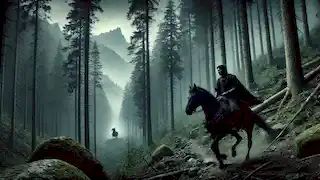
The Sorcerer of Mazandaran
The Battle with the Div-e Sefid
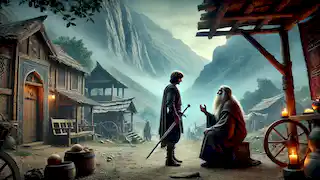
Victory and Return
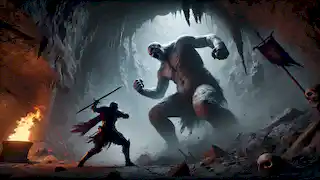
The Legacy of Rostam
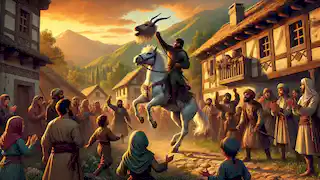
The Story of the Div-e Sefid (White Demon)
Reading Time: 9 min
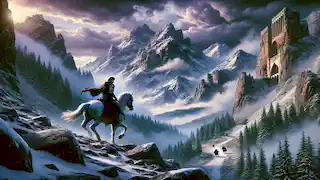
About Story: The Story of the Div-e Sefid (White Demon) is a Myth Stories from iran set in the Ancient Stories. This Dramatic Stories tale explores themes of Courage Stories and is suitable for All Ages Stories. It offers Cultural Stories insights. A gripping tale of courage and heroism as Rostam faces the fearsome White Demon.

















